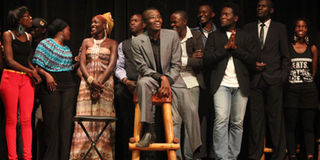A bitter sweet night of reciting poetry

The various poems were themed around the subject of love. From the unpleasant to the fulfilling ones and everything in between. PHOTOS BY ABU BAKER LUBOWA.
What you need to know:
Words:. A play on words to portray the many facets of love in the Ugandan context.
The poetry recital by the Lantern Meet of Poets on April 12 and 13 was a hit with the audience. There was laughter and applause. It was produced by Raymond Ojakol and directed by Moses Laku, both members of the poetry group.
Ojakol refers to it as “an impromptu production” saying there was less advance time for preparation. The production, dubbed Bitter Sweet, was themed on love to showcase poems “on the idea of love and how society perceives it.” The recital began with Carlton Mujuni on stage talking about “For today, we will write about love”.
Populist lines
In a piece performed by Mark Gordon Musinguzi, I Think About You where he listed the various ways he thought about his object of affection. He says, “I think about you the way middle-class women think about flying first class” and talks about “women of class” being aspirational.
Then when it comes to money, “I think about you the way poor people think about making money. I think about you the way rich people think about making money.” Aspiring to a higher social status is not something that is restricted by sex. It could have easily been “people” instead of “women” as it was for the money, but everyone talks about women aspiring to a higher class so it was the favourable line.
Foreign territory
The group’s recitals have always been stimulating. The themes and poetry prompt the audience to think about their society, choices and structures. Bitter Sweet was themed on love and the group might have had the audience laughing and clapping, but there was hardly any other kind of stimulation.
Ojakol agreed that love is a foreign territory for the group. “This does not mean members do not write about love. A lot of them do. Most of them, however, are cynical when it comes to love.”
The cynicism was perhaps what was supposedly being channeled in poems like Still Not Ready, performed by Donald Massa and Dating performed by Solomon Manzi. ( It was a play on Charles Warnke’s essay “You should date an illiterate girl”).
In Still Not Ready, the protagonist went on and on about a woman who was not ready for marriage and children, opting to study law and to focus on her career. The poem was repetitive with the phrase “still not ready” that was used as an interjection. The attempt to satirise the choice of a woman to wait on love and marriage in favour of her career was not mentally stimulating.
Local context
Other attempts were more natural and delightful, like situating the experience in Uganda. Lantern Meet is very good with this and the poems, deliberately or not, have metaphors rooted in the Ugandan experience.
When they wrote of bars and hanging out, they spoke of Kisementi. And when the poets referred to middle-class, they spoke of Kololo.
When in Happy Anniversary, performed by Jason Ntaro, the devoted husband returned home to a cheating partner, she had excuses. “It is not what it looks like.” At this point, Ntaro sneered, “Not what it looks like? Were you registering your simcard? Was he retrieving mobile money?”
Wardrobe
If there is anything that any artist in the audience should have walked away with that night, it should be the effort invested in the wardrobe. The clothes spoke of the characters on stage. The poem, One Day Even I Shall Be Tamed, performed by Juliet Kaboneire and Sandra Muhukku, might not have been spectacular but the choice to have the poets dressed in animal print was inspired. The poem included a lot of lines in animals and hunting.
There was also the drunk Patrick Massa that could have fooled me when he performed Damned but would later return to the stage for The Sound of A Thousand Claps looking not drunk at all. Solomon Manzi, for Dating wore a priest’s collar and all the others had that little detail that made all the difference. The heels, the colour of their clothes, the jacket they choose or even the addition of a musical instrument. Producer Ojakol says that they sought for “an attitude that embodies the spirit of the poem”. That attitude was almost perfect in the wardrobe choice.
Ambitious project
The recital was named Bitter Sweet to represent love as an experience that was both unpleasant and fulfilling. The performance was split into three parts, a deliberate attempt to present all sides to love. The group might have tried to present a full-circle experience on love to the audience: cynicism, satire and butterflies. This was an ambitious project and zeroing in on only one aspect of love might have helped to write less populist and more mentally-stimulating poems that we had come to associate with the group.




